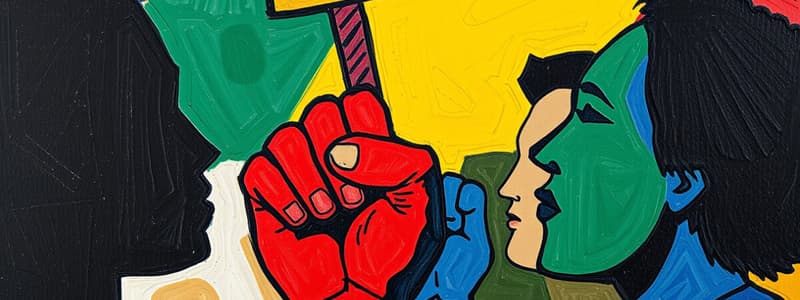Podcast
Questions and Answers
What is a boycott?
What is a boycott?
A voluntary refusal to use or buy something, usually for political reasons.
What is nonviolent resistance?
What is nonviolent resistance?
The idea that change can be achieved through peaceful protest.
Who was Rosa Parks?
Who was Rosa Parks?
An activist in the NAACP whose refusal to give up her seat on a bus to a white man helped spark the Montgomery Bus Boycotts.
Who was Martin Luther King Jr.?
Who was Martin Luther King Jr.?
What was the Montgomery Improvement Association (MIA)?
What was the Montgomery Improvement Association (MIA)?
What were the effects of the boycott?
What were the effects of the boycott?
What is the Student Nonviolent Coordinating Committee (SNCC)?
What is the Student Nonviolent Coordinating Committee (SNCC)?
What is the Congress of Racial Equality (CORE)?
What is the Congress of Racial Equality (CORE)?
What were Freedom Rides?
What were Freedom Rides?
What is Black Nationalism?
What is Black Nationalism?
A leader of the Montgomery Bus Boycott who became the spokesperson for nonviolent protest by African Americans was?
A leader of the Montgomery Bus Boycott who became the spokesperson for nonviolent protest by African Americans was?
The Montgomery Bus Boycott was based on the principle of?
The Montgomery Bus Boycott was based on the principle of?
The main purpose of the Southern Christian Leadership Conference was to?
The main purpose of the Southern Christian Leadership Conference was to?
The actions of four African American college students at a lunch counter in 1960 started a?
The actions of four African American college students at a lunch counter in 1960 started a?
The philosophies of Malcolm X and Martin Luther King Jr. are best described as?
The philosophies of Malcolm X and Martin Luther King Jr. are best described as?
Which best describes the social impact of the Montgomery Bus Boycott?
Which best describes the social impact of the Montgomery Bus Boycott?
A group that was led by Martin Luther King Jr. and trained volunteers in nonviolent resistance was?
A group that was led by Martin Luther King Jr. and trained volunteers in nonviolent resistance was?
Which leader joined the Nation of Islam while in jail and then brought many African Americans into the movement?
Which leader joined the Nation of Islam while in jail and then brought many African Americans into the movement?
A direct result of Rosa Parks' refusal to give up her seat on a Montgomery bus in 1955 was?
A direct result of Rosa Parks' refusal to give up her seat on a Montgomery bus in 1955 was?
Flashcards are hidden until you start studying
Study Notes
Key Terminology
- Boycott: A purposeful and voluntary refusal to utilize or purchase goods or services, often motivated by political beliefs.
- Nonviolent Resistance: A method of enacting change through peaceful protests rather than violence.
Key Figures
- Rosa Parks: NAACP activist known for her pivotal role in initiating the Montgomery Bus Boycotts by refusing to surrender her bus seat to a white passenger.
- Martin Luther King Jr.: Prominent national civil rights leader associated with the Montgomery Bus Boycott, founder of the Montgomery Improvement Association, and advocate for nonviolent resistance amidst significant personal risks.
Organizations
- Montgomery Improvement Association (MIA): Civil rights group founded on principles of nonviolent resistance, instrumental in organizing the Montgomery Bus Boycott and fighting segregation.
- Student Nonviolent Coordinating Committee (SNCC): Student-led organization formed by Ella Baker, known for organizing demonstrations, Freedom Rides, and the March on Washington.
- Congress of Racial Equality (CORE): Interracial group established by James Farmer to enhance race relations in the South, employing tactics like sit-ins to promote integration.
Events and Movements
- Montgomery Bus Boycott: Resulting from Rosa Parks' arrest, this boycott led to financial losses for the bus company, route closures affecting African American neighborhoods, and intensified civil rights activism. Protestors faced job losses and violence but inspired similar movements nationwide.
- Freedom Rides: Coordinated by CORE and SNCC, these bus trips challenged segregation in public transportation, faced violent opposition in certain regions.
- Sit-in Movement: Initiated by four African American college students at a lunch counter in 1960, this nonviolent act called for racial equality in dining establishments.
Philosophies and Impact
- Black Nationalism: Advocates for a distinct identity and unity within the African American community.
- Martin Luther King Jr. vs. Malcolm X: Their philosophies differed significantly; King endorsed nonviolence, whereas Malcolm X’s approach included elements of self-defense and black empowerment.
- Social Impact of the Montgomery Bus Boycott: It heightened national awareness of segregation issues and inspired boycotts and civil rights movements across the country.
Important Test Questions
- Leader of the Montgomery Bus Boycott: Martin Luther King Jr. became the spokesperson for nonviolent protest during this movement.
- Principle of the Montgomery Bus Boycott: Based on nonviolent resistance.
- Southern Christian Leadership Conference: Aimed to secure full equality for African Americans, nurturing leadership for peaceful protests.
Notable Outcomes
- Joining the Nation of Islam: Malcolm X, who became a prominent figure for African American rights after his induction into the Nation of Islam while in prison.
- Legacy of Rosa Parks: Her refusal to give up her seat sparked the Montgomery Bus Boycott, a critical event paving the way for future civil rights initiatives.
Studying That Suits You
Use AI to generate personalized quizzes and flashcards to suit your learning preferences.




